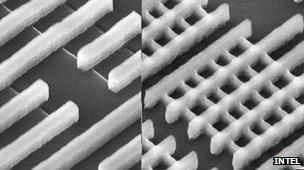Intel launches next-gen Ivy Bridge processors with 3D transistors
The chipmaker released 13 quad-core processors on Sunday and promised that new dual-core processors will arrive later in the spring. MacNN reports that the first batch of chips are from the Core i5 and i7 families.
CEO Paul Otellini said earlier this month that the "bulk" of the initial Ivy Bridge lineup would arrive in desktop PCs. However, Apple is expected to use the new quad-core chips in an update to its MacBook Pro line.
After moving to a 22nm process for Ivy Bridge, Intel boasts 20 percent more performance while using 20 percent less power. Intel PC business chief Kirk Skaugen told the BBC that the launch will be Intel's "fastest ramp ever."
"There will be 50% more supply than we had early in the product cycle of our last generation, Sandy Bridge, a year ago. And we're still constrained based on the amount of demand we're seeing in the marketplace," he said.
Ivy Bridge also introduces a transistor technology 11 years in the making. By moving from flat two-dimensional transistors to new three-dimensional "tri-gate transistors," Intel has managed to improve both performance and energy efficiency with minimal cost increases.
"A lot of people had thought that Moore's law was coming to an end," Skaugen told the BBC. "What Intel has been able to do is instead of just shrinking the transistor in two dimensions, we have been able to create a three-dimensional transistor for the first time.
Left: Traditional design; Right: Intel tri-gate, via BBC
Graphics are a key area of improvement for the new processors. Ivy Bridge supports 4K resolution and will feature as much as a 60 percent performance boost over the current-generation Sandy Bridge chips.
Dwindling inventory points to an upcoming upgrade of Apple's 15-inch MacBook Pro. AppleInsider reported in February that the company would first revamp its 15-inch MacBook Pro before eventually overhauling its 17-inch notebook.
Apple is expected draw upon the success of the MacBook Air by removing the optical disk drive from its pro-level notebooks. Reports have also suggested that the Mac maker may significantly increase the screen resolution of its laptops.
 Josh Ong
Josh Ong











 Mike Wuerthele
Mike Wuerthele

 Malcolm Owen
Malcolm Owen
 Chip Loder
Chip Loder

 William Gallagher
William Gallagher
 Christine McKee
Christine McKee
 Michael Stroup
Michael Stroup







